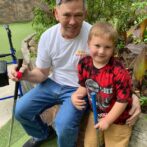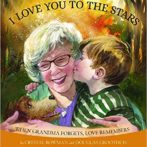Snapshots of Dementia: Meet Me in the Middle
I knew it would happen. I just didn’t know it would be so soon. I knew the day would come when our oldest grandson, who is now five and a half, would show more responsibility, be more careful, and have more understanding than my husband, who is living with dementia. I knew the day would come when our grandson’s brain, which is constantly growing, would work better and faster than my husband’s, which is constantly shrinking. I knew the day would come when the two would—in terms of cognitive ability—meet in the middle, one continuing to advance, the other continuing to decline. I knew it would happen. I just didn’t know it would hurt so much. I didn’t come to this realization in an instant, of course. In reaching this conclusion, I am probably several months behind. One of the places Tom and Lincoln both love is Chick-fil-A, Tom for the food and Lincoln for the play area (not to mention the ice cream). Over this school year, we have often picked Lincoln up on a Friday and taken him either to our house or this favorite spot for dinner and play time. When we visit our local Chick-fil-A, we have to walk across the drive-thru lane to enter the restaurant. I used to hold our grandson’s hand when we did this to make sure he stayed safe. But for the past several months, I’ve asked Lincoln to keep Grandpa safe. He walks beside Tom, holding his hand or his walker; looks both ways when we have to cross the drive-thru lane; and opens the door so Tom and I can go through first. In the past, I loved our trips to Chick-fil-A because it was one of the few places where Tom would engage with Lincoln. He would stay in the play area with him, hiding from him as he came down the slide, then jumping out to “scare” him. Even while LWD, he did his best to make sure Lincoln stayed safe. These days, I choose a table close to the play area because Tom rarely wants to go inside with Lincoln. I can monitor our busy boy from the table or, if I’m in the play area with him, keep an eye on Tom, who is usually sitting at the table, eating or staring into space. We can still do the same activity; it’s just different now. We can still enjoy our time together; it’s just different now. Tom’s still himself; he’s just different now. As time has gone on and his brain change has continued, I’ve made some necessary adjustments. Some of these have been big ones: Managing all our money. Becoming the sole breadwinner....
Read More






